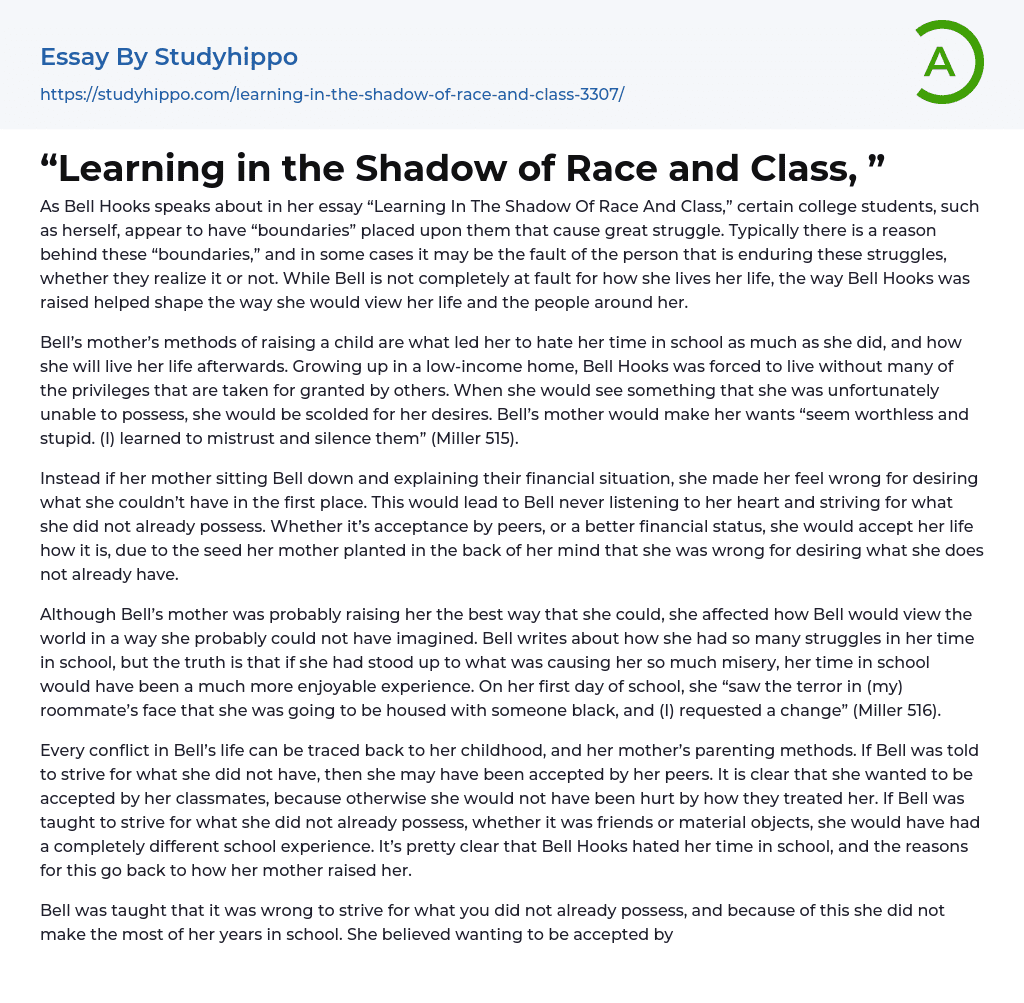As Bell Hooks speaks about in her essay “Learning In The Shadow Of Race And Class,” certain college students, such as herself, appear to have “boundaries” placed upon them that cause great struggle. Typically there is a reason behind these “boundaries,” and in some cases it may be the fault of the person that is enduring these struggles, whether they realize it or not. While Bell is not completely at fault for how she lives her life, the way Bell Hooks was raised helped shape the way she would view her life and the people around her.
Bell’s mother’s methods of raising a child are what led her to hate her time in school as much as she did, and how she will live her life afterwards. Growing up in a low-income home, Bell Hooks was forced to live without man
...y of the privileges that are taken for granted by others. When she would see something that she was unfortunately unable to possess, she would be scolded for her desires. Bell’s mother would make her wants “seem worthless and stupid. (I) learned to mistrust and silence them” (Miller 515).
Instead if her mother sitting Bell down and explaining their financial situation, she made her feel wrong for desiring what she couldn’t have in the first place. This would lead to Bell never listening to her heart and striving for what she did not already possess. Whether it’s acceptance by peers, or a better financial status, she would accept her life how it is, due to the seed her mother planted in the back of her mind that she was wrong for desiring what she does not already
have.
Although Bell’s mother was probably raising her the best way that she could, she affected how Bell would view the world in a way she probably could not have imagined. Bell writes about how she had so many struggles in her time in school, but the truth is that if she had stood up to what was causing her so much misery, her time in school would have been a much more enjoyable experience. On her first day of school, she “saw the terror in (my) roommate’s face that she was going to be housed with someone black, and (I) requested a change” (Miller 516).
Every conflict in Bell’s life can be traced back to her childhood, and her mother’s parenting methods. If Bell was told to strive for what she did not have, then she may have been accepted by her peers. It is clear that she wanted to be accepted by her classmates, because otherwise she would not have been hurt by how they treated her. If Bell was taught to strive for what she did not already possess, whether it was friends or material objects, she would have had a completely different school experience. It’s pretty clear that Bell Hooks hated her time in school, and the reasons for this go back to how her mother raised her.
Bell was taught that it was wrong to strive for what you did not already possess, and because of this she did not make the most of her years in school. She believed wanting to be accepted by her peers, and wanting to resolve her other conflicts, was wrong, and because of this she grew to
hate everything about her life at school. The “boundaries” that she believes were places upon her were the boundaries of her upbringing. Works Cited Miller, James S. Acting Out Culture: Reading And Writing. New York: Bedford/St. Martin’s, 2008. Print.
- Academia essays
- Higher Education essays
- Language Learning essays
- Studying Business essays
- Education System essays
- Study essays
- First Day of School essays
- Scholarship essays
- Pedagogy essays
- Curriculum essays
- Coursework essays
- Studying Abroad essays
- Philosophy of Education essays
- Purpose of Education essays
- Brainstorming essays
- Educational Goals essays
- Importance Of College Education essays
- Brown V Board of Education essays
- The Importance Of Higher Education essays
- Online Education Vs Traditional Education essays
- Academic And Career Goals essays
- Academic Integrity essays
- Brown Vs Board Of Education essays
- Distance learning essays
- Technology in Education essays
- Vocabulary essays
- Writing Experience essays
- Importance of Education essays
- Early Childhood Education essays
- Academic Degree essays
- Academic Dishonesty essays
- School Uniform essays
- Academic writing essays
- Cheating essays
- Bachelor's Degree essays
- MBA essays
- College Life essays
- Grade essays
- Diploma essays
- Phonology essays
- Sentence essays
- Filipino Language essays
- Pragmatics essays
- Millennium Development Goals essays
- History Of Education essays
- Graduate School essays
- Middle School essays
- School essays
- Special Education essays
- University essays




